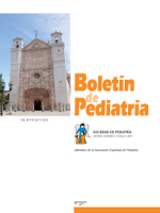Efecto del bajo peso al nacer sobre el desarrollo cognitivo
Y. Ramírez Benítez , M. Díaz Bringas , E.F. Álvarez Marqués
Bol. Pediatr. 2013; 53 (223): 13 - 20
Introducción. Los niños bajo peso son una población clínica de interés en el sistema nacional de salud. Existen pocos estudios que muestren el perfil neurológico, neurofisiológico y cognitivo conductual en esta población. La literatura reporta con mayor frecuencia las alteraciones neurológicas y conductuales de la población <1.500 g y en menor medida en el niño bajo peso 1.500-2.500 g. Material y Método. La revisión de historias clínicas en el Centro de Rehabilitación del Neurodesarrollo "Rosa Luxemburgo" permitió realizar un estudio piloto con una muestra no probabilística de 14 niños de 6 años. La investigación pretende caracterizar el perfil neuropsicológico del niño bajo peso 1.500-2.500 g. Determinar el efecto del bajo peso sobre las variables: perfil neuropsicológico, perfil intelectual y madurez neurológica. Las pruebas seleccionadas de las historias clínicas fueron: Prueba Bender, aplicada a los 5 años. Prueba de inteligencia de Wechsler para niños (WISC) y la bateria neuropsicológica Luria Inicial aplicadas a los 6 años. Resultados. El desarrollo cognitivo está limitado en las habilidades motoras primarias (motricidad gruesa) y no así en las secundarias (praxis motoras y orales). La percepción de objetos se mantiene intacta, solo que la ubicación espacial del acto motor y de figuras en un tablero se mantiene con determinado "enlentecimiento" para la edad. Presentan problemas en las habilidades pre-matemáticas (cálculos sencillos) y habilidades basicas del pensamiento (compara objetos sin ayuda visual). La regresión múltiple muestra que el bajo peso no correlaciona significativamente con la inteligencia, madurez neurológica y desarrollo cognitivo. La regresión simple lineal muestra que el desarrollo motor primario predice la capacidad intelectual y la madurez neurológica de los infantes.
Effect of low weight at birth on cognitive development
Introduction.
Low birth weight children are a clinical population of interest in the national system of health. There are few studies that show the neurological, neurophysiological and behavioral cognitive profile in this population. The literature reports, with more frequency, the population's neurological and behavioral alterations < 1,500 g and in smaller measure in the low weight child 1,500-2,500 g.
Material and Methods.
The clinical revision of histories in the Center of Rehabilitation of Neurodevelopment "Rosa Luxemburg" allowed to carry out a pilot study with a not probabilistic sample 14, 6 year-old children's. The investigation seeks to characterize the low weight child's neuropsychologicalprofile 1,500-2,500 g. Determine the effect of the low weight on the variable: neuropsychological, intellectual profile and neurological maturity. The selected tests from the clinical histories were: Bender test, applied to the 5 years. Wechsler Intelligence Scale for children test (WISC) and the Initial Luria neuropsychological battery applied to the 6 years.
Results.
The cognitive development is limited in the primary motor abilities and not limited in the secondary abilities. The perception of objects stays intact, only the space location of the motor act as well of figures in a board stays with certain "sluggishness" for the age. They present problems in the pre-mathematics abilities (simple calculations) and basic abilities of the thought (to compare objects without visual help). The multiple regressions show that the low birth weight doesn't correlate significantly with the intelligence, neurological maturity and I cognitive development. The regression simple lineal show that the primary motor development predicts the intellectual capacity and the neurological maturity of the infants.
Artículo completo (PDF) (190 kb.)
- Psicología
